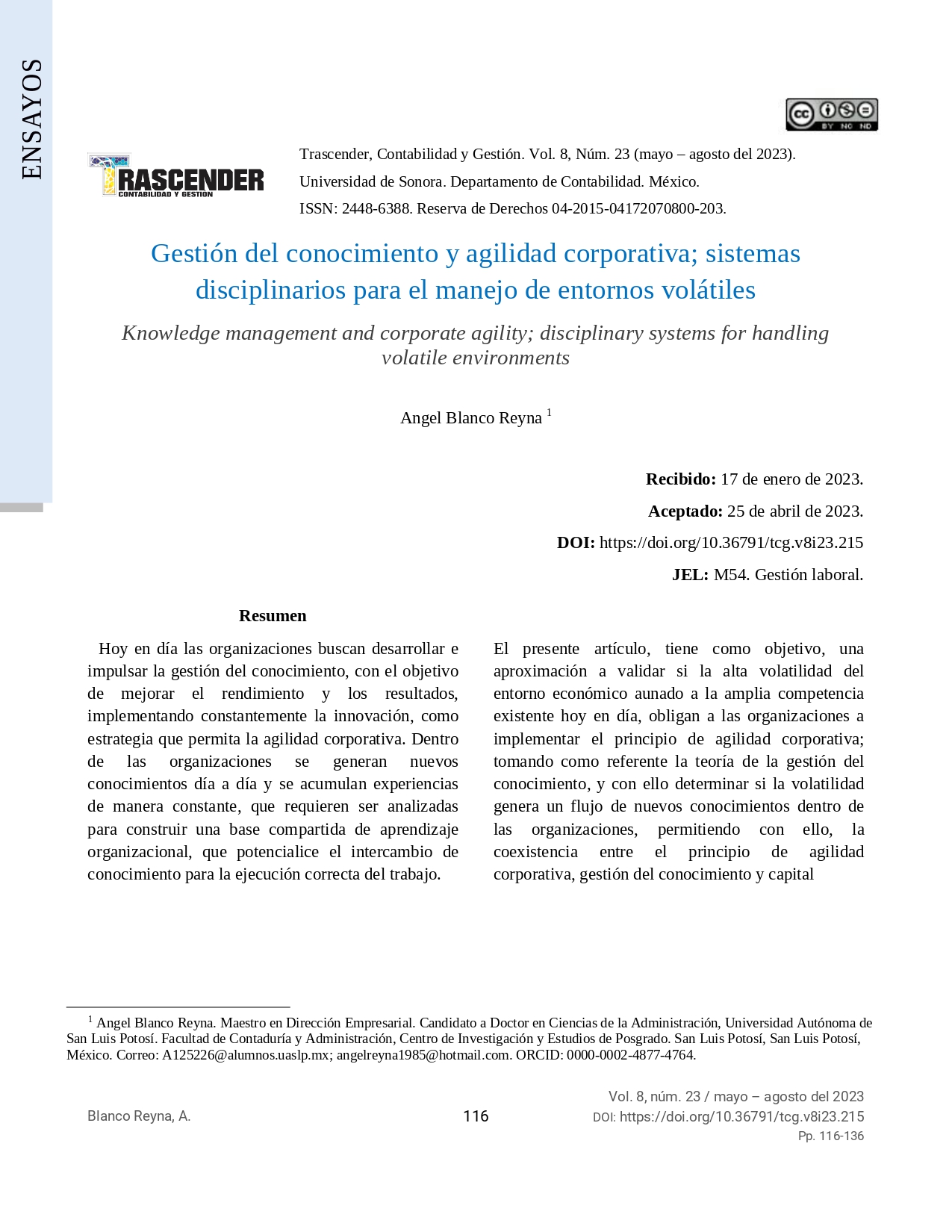Knowledge management and corporate agility; disciplinary systems for handling volatile environments
DOI:
https://doi.org/10.36791/tcg.v8i23.215Keywords:
Knowledge management, corporate agility, innovation, volatility, intellectual capitalAbstract
Currently, organizations seek to develop and promote knowledge management, with the aim of improving performance and results, constantly implementing innovation, as a strategy that allows corporate agility. Within organizations, new knowledge is generated day by day and experiences are constantly accumulated, which need to be analyzed to build a shared organizational learning base that enhances the exchange of knowledge for the correct work execution. Goal of this article is getting an approximation for validating if the high volatility of the economic environment coupled with the wide competition that exists today, force organizations to implement corporate agility; taking the theory of knowledge management as a reference, and thereby determining if volatility generates a flow of new knowledge within organizations, thus allowing the coexistence between corporate agility, knowledge management and intellectual capital.
Downloads
References
Acosta, M. (2012). Estrategias Tecnológicas de Gestión del conocimiento. Blogspot. Recuperado el 26 de febrero de 2012, de http://gestionconocimientoorg.blogspot.com/2012/02/propuesta-de-integracion gestion-de.html.
Adamczewski, P. (2016). ICT solutions in intelligent organizations as achallenges in a knowledge economy. De Gruyter. Management, 20(2), 198-209. DOI: https://doi.org/10.1515/manment-2015-0060
Alavi, M., y Leidner, D. (2001). Review: Knowledge management and knowledge management systems: Conceptual foundations and research issues. MIS Quarterly, 25(1), 107-136. DOI: https://doi.org/10.2307/3250961
Allee, V., y Taug, J. (2006). Collaboration, innovation, and value creation in a global telecom. The learning organization, 13(6), 569-578. DOI: https://doi.org/10.1108/09696470610705451
Angulo, E., y Negron, M. (2008). Modelo holístico para la gestión de conocimiento. Negotium, 4(11), 38-51.
Arboníes, A. L., Azúa, S., Bueno, E., Carrillo, F. J., y Vázquez, V. (2001). Cómo evitar la miopía en la gestión del conocimiento. Madrid: Díaz de Santos S.A.
Bueno, C. E. (2001). Gestión del conocimiento en universidades y organismos públicos de investigación. Madrimas. Recuperado el 16 de mayo de 2003, de http://www.madrimasd.org/informacionidi/biblioteca/publicacion/doc/16_GestionCon cimientoUniversidades OPIS.pdf.
Calin, I., Pargaru, I., y Neascu, M. (2015). The role of smart organization in socio economic environment. Valahian Journal Economic Studies.
Contreras, F., y Tito, P. (2013). La gestión del conocimiento y las políticas públicas. Perú: Universidad María Auxiliadora. Daft, R. L. (2001). Organization: Theory and design. EE.UU: South-Western. Thomson Learning.
De Smet, A. (2015). The keys to organizational agility. McKinsey y Company. Recuperado el 01 de diciembre de 2015, de https://www.mckinsey.com/capabilities/people-and- organizational-performance/our-insights/the-keys-to-organizational-agility
Denning, S. (2020). The Business Agility Report. Business Agility Institute. Recuperado el 07 de diciembre de 2022, de https://businessagility.institute/learn/domains-of- business-agility
Drucker, P. (1993). Post-capitalist society. Oxford: Butterworth Heinemann. Forero, T. (2021). Agilidad empresarial: Sé mejor, más rápido y más fuerte que tu competencia. Recuperado el 27 de marzo de 2021, de https://www.crehana.com/blog/negocios/agilidad-empresarial/.
Fuentes, B. (2010). La gestión de conocimiento en las relaciones académico empresariales. Un nuevo enfoque para analizar el impacto del conocimiento académico. Tesis doctoral. España: Universidad Politécnica de Valencia. Girard, J., y Girard, J. (2015). Defining knowledge management: Toward and applied compendium. Online Journal Applied Knowledge Management, 3(1), 1-20.

Downloads
Published
How to Cite
Issue
Section
License
Copyright (c) 2023 Ángel Blanco Reyna

This work is licensed under a Creative Commons Attribution-NonCommercial-NoDerivatives 4.0 International License.
La Revista Trascender, Contabilidad y Gestión se compromete a asegurar la confidencialidad y privacidad dela información personal que se capture en éste sistema de conformidad con los lienamientos editoriales de la Universidad de Sonora
La información será utilizada únicamente para fines editoriales, académicos y de investigación, notificándose de forma directa al usuario registrado en el sistema, con el alcance que el usuario establezca al momento de su registro.

























